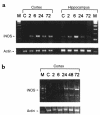Inducible nitric oxide synthase is an endogenous neuroprotectant after traumatic brain injury in rats and mice
- PMID: 10487779
- PMCID: PMC408535
- DOI: 10.1172/JCI6670
Inducible nitric oxide synthase is an endogenous neuroprotectant after traumatic brain injury in rats and mice
Abstract
Nitric oxide (NO) derived from the inducible isoform of NO synthase (iNOS) is an inflammatory product implicated both in secondary damage and in recovery from brain injury. To address the role of iNOS in experimental traumatic brain injury (TBI), we used 2 paradigms in 2 species. In a model of controlled cortical impact (CCI) with secondary hypoxemia, rats were treated with vehicle or with 1 of 2 iNOS inhibitors (aminoguanidine and L-N-iminoethyl-lysine), administered by Alzet pump for 5 days and 1. 5 days after injury, respectively. In a model of CCI, knockout mice lacking the iNOS gene (iNOS(-/-)) were compared with wild-type (iNOS(+/+)) mice. Functional outcome (motor and cognitive) during the first 20 days after injury, and histopathology at 21 days, were assessed in both studies. Treatment of rats with either of the iNOS inhibitors after TBI significantly exacerbated deficits in cognitive performance, as assessed by Morris water maze (MWM) and increased neuron loss in vulnerable regions (CA3 and CA1) of hippocampus. Uninjured iNOS(+/+) and iNOS(-/-) mice performed equally well in both motor and cognitive tasks. However, after TBI, iNOS(-/-) mice showed markedly worse performance in the MWM task than iNOS(+/+) mice. A beneficial role for iNOS in TBI is supported.
Figures








References
-
- Lassmann H. Basic mechanisms of brain inflammation. J Neural Transm Suppl. 1997;50:183–190. - PubMed
-
- McGeer PL, McGeer EG. The inflammatory response system of brain: implications for therapy of Alzheimer and other neurodegenerative diseases. Brain Res Brain Res Rev. 1995;21:195–218. - PubMed
-
- Pfister HW, Scheld W. Brain injury in bacterial meningitis: therapeutic implications. Curr Opin Neurol. 1997;10:254–259. - PubMed
-
- Feuerstein GZ, Wang X, Barone FC. Inflammatory gene expression in cerebral ischemia and trauma. Potential new therapeutic targets. Ann NY Acad Sci. 1997;825:179–193. - PubMed
-
- Hallenbeck JM. Significance of the inflammatory response in brain ischemia. Acta Neurochir Suppl (Wien) 1996;66:27–31. - PubMed
Publication types
MeSH terms
Substances
Grants and funding
LinkOut - more resources
Full Text Sources
Other Literature Sources
Molecular Biology Databases
Miscellaneous

